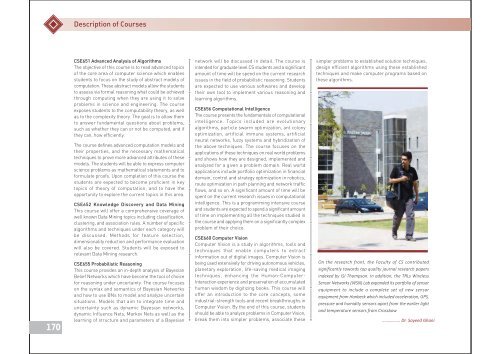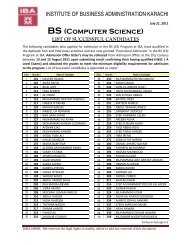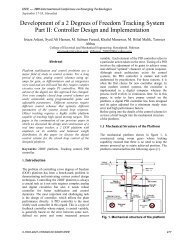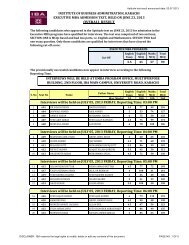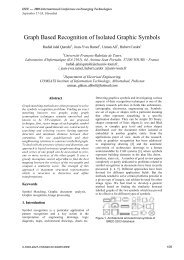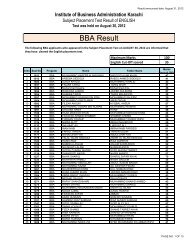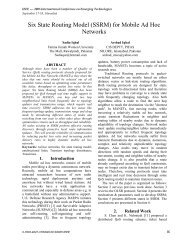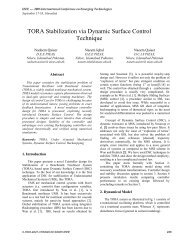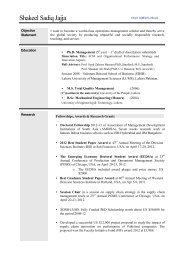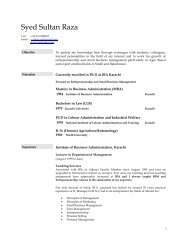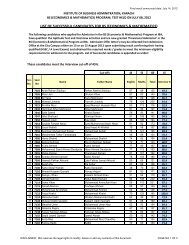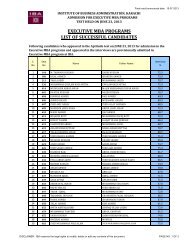Description <strong>of</strong> Courses170CSE651 Advanced Analysis <strong>of</strong> AlgorithmsThe objective <strong>of</strong> this course is to read advanced topics<strong>of</strong> the core area <strong>of</strong> computer science which enablesstudents to focus on the study <strong>of</strong> abstract models <strong>of</strong>computation. These abstract models allow the studentsto assess via formal reasoning what could be achievedthrough computing when they are using it to solveproblems in science and engineering. The courseexposes students to the computability theory, as wellas to the complexity theory. The goal is to allow themto answer fundamental questions about problems,such as whether they can or not be computed, and ifthey can, how efficiently.The course defines advanced computation models andtheir properties, and the necessary mathematicaltechniques to prove more advanced attributes <strong>of</strong> thesemodels. The students will be able to express computerscience problems as mathematical statements and t<strong>of</strong>ormulate pro<strong>of</strong>s. Upon completion <strong>of</strong> this course thestudents are expected to become pr<strong>of</strong>icient in keytopics <strong>of</strong> theory <strong>of</strong> computation, and to have theopportunity to explore the current topics in this area.CSE652 Knowledge Discovery and Data MiningThis course will <strong>of</strong>fer a comprehensive coverage <strong>of</strong>well known Data Mining topics including classification,clustering, and association rules. A number <strong>of</strong> specificalgorithms and techniques under each category willbe discussed. Methods for feature selection,dimensionality reduction and performance evaluationwill also be covered. Students will be exposed torelevant Data Mining research.CSE655 Probabilistic ReasoningThis course provides an in-depth analysis <strong>of</strong> BayesianBelief Networks which have become the tool <strong>of</strong> choicefor reasoning under uncertainty. The course focuseson the syntax and semantics <strong>of</strong> Bayesian Networksand how to use BNs to model and analyze uncertainsituations. Models that aim to integrate time anduncertainty such as dynamic Bayesian networks,dynamic Influence Nets, Markov Nets as well as thelearning <strong>of</strong> structure and parameters <strong>of</strong> a Bayesiannetwork will be discussed in detail. The course isintended for graduate level CS students and a significantamount <strong>of</strong> time will be spend on the current researchissues in the field <strong>of</strong> probabilistic reasoning. Studentsare expected to use various s<strong>of</strong>twares and developtheir own tool to implement various reasoning andlearning algorithms.CSE656 Computational IntelligenceThe course presents the fundamentals <strong>of</strong> computationalintelligence. Topics included are evolutionaryalgorithms, particle swarm optimization, ant colonyoptimization, artificial immune systems, artificialneural networks, fuzzy systems and hybridization <strong>of</strong>the above techniques. The course focuses on theapplications <strong>of</strong> these techniques on real world problemsand shows how they are designed, implemented andanalyzed for a given a problem domain. Real worldapplications include portfolio optimization in financialdomain, control and strategy optimization in robotics,route optimization in path planning and network trafficflows, and so on. A significant amount <strong>of</strong> time will bespent on the current research issues in computationalintelligence. This is a programming intensive courseand students are expected to spend a significant amount<strong>of</strong> time on implementing all the techniques studied inthe course and applying them on a significantly complexproblem <strong>of</strong> their choice.CSE660 Computer VisionComputer Vision is a study in algorithms, tools andtechniques that enable computers to extractinformation out <strong>of</strong> digital images. Computer Vision isbeing used extensively for driving autonomous vehicles,planetary exploration, life-saving medical imagingtechniques, enhancing the Human-Computer-Interaction experience and preservation <strong>of</strong> accumulatedhuman wisdom by digitizing books. This course will<strong>of</strong>fer an introduction to the core concepts, someindustrial-strength tools and recent breakthroughs inComputer Vision. By the end <strong>of</strong> this course, studentsshould be able to analyze problems in Computer Vision,break them into simpler problems, associate thesesimpler problems to established solution techniques,design efficient algorithms using these establishedtechniques and make computer programs based onthese algorithms.On the research front, the Faculty <strong>of</strong> CS contributedsignificantly towards top quality journal research papersindexed by ISI Thompson. In addition, the TRLs WirelessSensor Networks (WSN) Lab expanded its portfolio <strong>of</strong> sensorequipment to include a complete set <strong>of</strong> new sensorequipment from Hanbeck which included acceleration, GPS,pressure and humidity sensors apart from the earlier lightand temperature sensors from Crossbow……………. Dr. Sayeed Ghani
Description <strong>of</strong> CoursesICT & ALLIED COURSESICT509 Network Architectures for <strong>Business</strong>The information architecture <strong>of</strong> the Internet enabledorganization including the use and development <strong>of</strong>client/server and distributed systems. A detailedanalysis <strong>of</strong> networking and telecommunicationsincluding data, voice, image, video, network hardware,and topology concepts, models, architectures, andstandards for the design, implementation, integration,security, and management <strong>of</strong> distributed Internet andIntranet enabled systems and networks is done. Thishelps to understand the role <strong>of</strong> the informationarchitecture and distributed systems in organizationaldesign and management strategy.ICT511 Advanced Computer NetworksThis course will cover advanced concepts in computernetwork such as: Advanced Internet addressing (CIDRand NAT), End-to-end protocols, Multicast Addressresolution server, Multi protocol over ATM, IP Switching/ Tag Switching, Multi protocol label Switching(MPLS),scheduling and congestion control in the Internet,Quality <strong>of</strong> service in the Internet, Internet RoutingArchitecture, Border Gateway Protocol (BGP), ResourceReservation Protocol (RSVP), IP version 6, Wi-Fi andWi-Max, and Mobile IP.ICT512 Advanced Web TechnologiesTo deliver in-depth knowledge <strong>of</strong> the basic conceptsand general principles associated with web applicationdevelopment, illustrating specific technologies. Toprovide an understanding <strong>of</strong> different concepts,architectures, techniques, and infrastructures forservice oriented computing in web development. Thecourse explains the principles and practice <strong>of</strong> webservices. It provides a comprehensive overview <strong>of</strong> state<strong>of</strong> the art web services and associated disciplines,relating concepts to practical examples and emergingstandards.ICTXXX Distributed SystemsThis course deals with an in-depth understanding <strong>of</strong>Distributed Systems. Distributed system is a computersystem consisting <strong>of</strong> several independent computers,connected by a network, that can work together toperform a task or provide a service. Typical examplesinclude: the World Wide Web, networked file systems,DNS, and massive multiprocessor supercomputers.This course focuses on the principles, techniques, andpractices relevant to the design and implementation<strong>of</strong> such systems. The course takes a systems-orientedview <strong>of</strong> distributed systems, concentrating oninfrastructure s<strong>of</strong>tware and providing hands-onexperience implementing distributed systems. Themain objectives <strong>of</strong> this are: to present the principlesunderlying the functioning <strong>of</strong> distributed systems; tocreate an awareness <strong>of</strong> the major technical challengesin distributed systems design and implementation; toexpose students to modern and classic technologyused in distributed systems and their s<strong>of</strong>tware; toexpose students to past and current research issuesin the field <strong>of</strong> distributed systems; and to provideexperience in the implementation <strong>of</strong> typical algorithmsused in distributed systemsICTXXX Mobile ComputingThis course presents an extensive overview <strong>of</strong> thetechnical as well as business aspects <strong>of</strong> mobilecomputing and wireless communications. Main topicsto be covered are: mobile applications, mobilecomputing platforms, wireless networks, architectures,security, and management, <strong>of</strong> mobile computing andwireless communications. The role <strong>of</strong> wireless Internetand Mobile IP is reviewed and the mobile computingplatforms are examined with a discussion <strong>of</strong> wirelessmiddleware, wireless gateways, mobile applicationservers, WAP, i-mode, J2ME, BREW, Mobile InternetToolkit, and Mobile Web Services.ICTXXX Wireless CommunicationThe objective <strong>of</strong> this course is to provide the studentwith an adequate understanding <strong>of</strong> the prevalent MobileWireless Networks. The course will discuss the protocolreference model(s) that relate to Mobile WirelessCommunication Systems. It will mainly cover thephysical, data link, and the application layers fromuser plane perspective as they apply to mobile wirelessnetworks in use today. Additionally, it will cover themanagement and control plane functions.ICTXXX Information SecurityThe purpose <strong>of</strong> this course is to introduce students tothe fundamental concepts and issues <strong>of</strong> informationsecurity. Basic principles for information security;threats and defenses; cryptography; introduction tonetwork security and security management are coveredin this course. By the end <strong>of</strong> this course the studentshould be able to understand the importance <strong>of</strong>information security in s<strong>of</strong>tware systems, understandwhat a security policy is and what are the majormechanisms for implementing security policies, havea background in information security sufficient for thestudy <strong>of</strong> computer networking, be familiar with themajor educational resources available for informationsecurity and be able to effectively present ideas aboutinformation security in written, oral, and web formats.Human Computer InteractionPrerequisite: S<strong>of</strong>tware Engineering, Introduction toHCIIntelligent SystemsPrerequisite: Artificial Intelligence, Object-Oriented<strong>Program</strong>ming, Introduction to StatisticsS<strong>of</strong>tware EngineeringPrerequisite: Object-Oriented <strong>Program</strong>ming,Introduction to S<strong>of</strong>tware EngineeringInformation ManagementPrerequisite: Database SystemsTheoretical Computer SciencePrerequisite: Computer Architecture, Algorithms.Net - Centric ComputingPrerequisite: Operating System, Data Communication& Networks, Introduction to Statistics171


